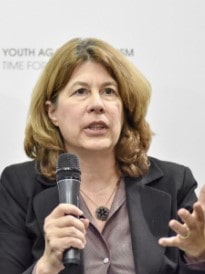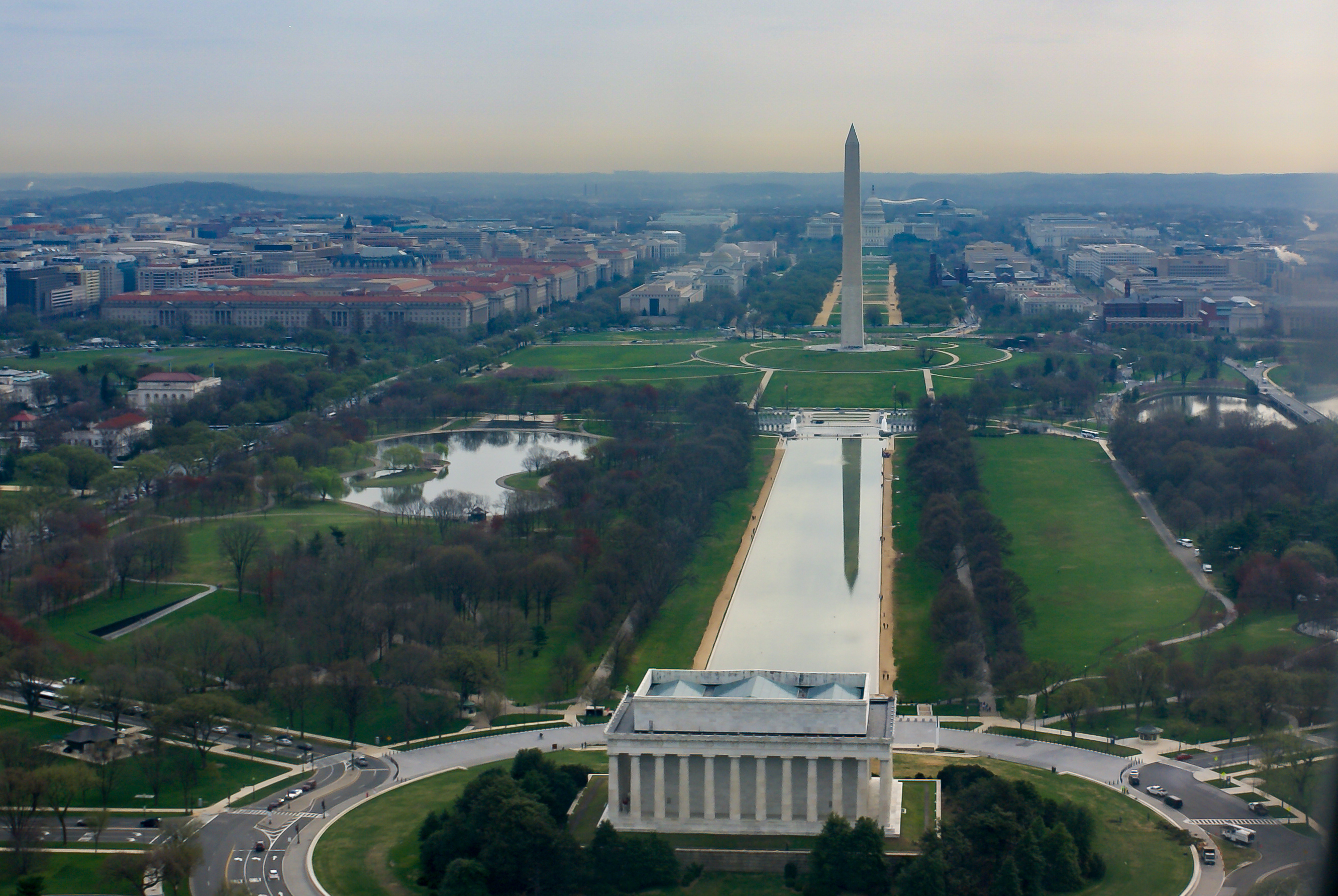The War on Nonprofits
Persecuting NGOs in the name of national security often serves as a pretense for government efforts to quiet dissent and consolidate power.
krakd.jpeg?sfvrsn=c6e2ba28_5)
On June 11, Rep. Marjorie Taylor Green (R-Ga.) and her colleagues on the House Delivering on Government Efficiency Subcommittee launched an investigation into 200 nonprofit organizations suspected of supporting illegal immigration. On the same day, Sen. Josh Hawley (R-Mo.) and the Senate Subcommittee on Crime and Counterterrorism announced a similar investigation in the wake of the peaceful protests in Los Angeles.
These are not isolated incidents. Just last week, Green hosted a hearing entitled “Public Funds, Private Agendas: NGOs Gone Wild” aimed at “exposing” nongovernment organizations (NGOs) as “corrupt” agents of “money laundering” and “abuse.” Meanwhile, a provision that would allow the secretary of the treasury to accuse any nonprofit of being a “terrorist supporting organization” without providing evidence was defeated narrowly in the House Ways and Means Committee.
These actions synchronize with a growing, coordinated movement by Republican-controlled state legislatures to pass domestic terrorism laws—and to use post-Sept. 11 state laws that criminalize domestic terrorism, or support and assistance for it—to suppress civil society and citizen activism.
Americans typically think of NGOs as organizations providing “public benefit”: feeding the poor, aiding social causes, or supporting health or medical research. As the law governing 501(c) status states, no particular person or stakeholder makes a profit from these activities. The broad array of big and small political ideas, social causes, and local and national efforts has led to a nonprofit landscape of more than 1.48 million nationally.
So why are conservative leaders in Congress attempting to link these organizations with crime and terrorism? In repressive regimes around the world, expanding the government’s ability to label groups as criminals and terrorist organizations has been a successful tool—not to prevent terrorism, but to shrink the public space, limit social discourse, and consolidate authoritarian power. As Republican actions indicate an effort is underway to target NGOs, considering how other governments have chosen to categorize domestic citizen groups as a threat to erode fundamental rights could provide key insights into how to approach events in the United States.
The War on Terror and the Original Sin of Targeting Nonprofits
In the wake of the terrorist attacks of 2001, there was growing suspicion that groups such as the Muslim Brotherhood were complicit—if not in directly supporting terrorism, then in providing financial or logistical assistance. This suspicion resulted in secretive government actions and congressional hearings; attacks on Arab American individuals and organizations increased 1600 percent from previous years. Terrorist incidents in the United Kingdom, Australia, and other locations generated similar animosity and suspicion, but the government response differed. Unlike in the U.S.—where the government viewed nonprofits as potentially subversive—leaders in the U.K. and elsewhere treated charitable organizations as allies in the fight against terror.
The U.S. government began putting in place legal frameworks to label nonprofits “material supporters” of terrorism following the 1993 attacks on the World Trade Center. Following Sept. 11, the Patriot Act expanded the “material support” prohibition to bar “expert advice or assistance” to terrorist organizations. In late 2001, several Muslim charities—the Benevolence International Foundation, the Global Relief Foundation, and the Holy Land Foundation for Relief and Development—were prosecuted on charges of providing material support to a foreign terrorist organization, leading to frozen assets and effectively forcing their closure. Muslim charities, faced with an unfriendly American public, were not vocal in their opposition; U.S. civil society in general, fearing public or government retribution, did not speak out about the perils of such prosecutions—including the potential for broad targeting of NGOs.
Fast forward 20 years and as a report compiled by a group of major civil rights organizations presented at the United Nations stated:
[A]fter 9/11, the terrorism framework and the “War on Terror” has taken hold at almost every level of government and law enforcement, shrinking the space for movements, dissent, and civil society, and hindering the rights enshrined and protected in the ICCPR. Today, it has become clear that the laws passed, agencies and infrastructures created, and rationales promulgated to ostensibly make Americans safer, combat terror, and preempt harm have all been turned against Black dissent, Indigenous activists, Muslim, Arab and South Asian communities, environmental justice groups, and the increasingly intersectional movements that challenge an unjust status quo. Rather than being “unintended consequences” of the security apparatus, the chilling and disruptive effect of these laws must be understood as an intentional outcome. It is a feature, not a bug, of the so-called “counterterrorism” architecture.”
In short, efforts to counter terrorism and address the legitimate fears and concerns of American citizens opened the door for abuse of the same provisions for political purposes. The first Trump administration responded to the genuine grievances expressed in nationwide Black Lives Matter (BLM) peaceful protests with allegations of terrorism, and the mounting of a militarized response. In this administration, Trump’s actions—including invoking the Alien Enemies Act —demonstrate an intent to operate outside the law under the pretext of national security. Across the country, religious groups providing assistance to migrants are being criminalized; in Georgia, protesters are being charged as terrorists. These ever-expanding laws created by conservative lawmakers are the direct consequence of government impunity in the post-Sept. 11 era.
Drawing Global Lessons
Sadly, these dynamics are not unique to the United States. Just a few weeks ago, the UN’s top human rights observer, Special Rapporteur Ben Saul, released a report on the state of “countering terrorism” laws. Saul did not observe a reduction in global terrorism, trafficking, and money laundering as a result of these laws but, rather, a rampant misuse of counterterrorism measures that “jeopardized the freedoms of the innocent” through unlawful killings, arbitrary detention, unfair trials, privacy infringements from mass surveillance, and the criminalization of freedoms of expression, assembly, association, and political participation. “The misuse of counter-terrorism measures not only violates the rights of suspected criminals but can also jeopardise the freedoms of the innocent,” Saul said.
Terrorism is a serious threat, and in moments of national panic and fear—as America experienced in the wake of Sept. 11—action from the government is expected. But terrorism laws also give unique legitimacy to such governments rendering them a convenient tool for those with dictatorial ambitions. Using force to disrupt peaceful gatherings, monitoring the cell phones and web traffic of nonprofit leaders and journalists, and detaining those advocating for things like fair wages are all useful tools for a government that wants to stay in power.
There is extensive research on the use and abuse of counterterrorism laws by governments. Here, as a means of contextualizing current trends in the U.S., we break down the process by which governments globally have consolidated power and undermined democracy under the pretense of national security.
Act One: Target domestic groups with counterterrorism laws in the name of law and order.
Daniel Ortega in Nicaragua, Abdel Fattah el-Sisi in Egypt, and Recep Tayyip Erdogan in Turkey all used anti-terrorism and law and order rhetoric to compromise civil society and the political opposition, strengthening their authoritarian legitimacy. People like security and stability, and for those who aren’t paying much attention, there is generally trust that law enforcement entities are acting justly. At this point, the United States has a broad array of counterterrorism laws, but most are restrained by civil liberty provisions, including engaging citizen groups in governance and checks such as the Department of Homeland Security Office for Civil Rights and Civil Liberties (CRCL). However, when these sorts of mechanisms are not present or are eliminated—as the Trump administration recently did with CRCL—the risk of abuse increases.
Act Two: Use these laws to make your enemies’ lives difficult.
When Narendra Modi came to power in 2014, he harnessed India’s previously little used Unlawful Activities Prevention Act (UAPA)—a terrorism prevention law—to arrest and detain opposition voices, including journalists, academics, and civil society members. Although only a small number of arrests under the UAPA resulted in conviction, pretrial detention times were extensive and trials were often considerably delayed, leaving opposition leaders sitting in jail for unpredictable periods of time. For authoritarians, the utility of anti-terrorism laws is in their vagueness; in India, the power to arrest even those only talking about regime opposition proved valuable in entrenching Modi’s power. In the United States, Trump has thus far used executive orders to target his political enemies, even directing the IRS to investigate them. Such actions don’t necessarily have to be successful to inflict damage; the cost of legal proceedings and reputational harms associated with the president’s attacks have often been sufficient to quiet opposition. A terrorism charge would put an organization at significant legal, political, and reputational risk.
Act Three: Vilify the entire NGO sector.
When Turkey was flagged by the international Financial Action Task Force (FATF) for not fully complying with their recommendations to robustly combat money laundering and terrorism financing, the parliament, dominated by Erdogan’s Justice and Development Party, passed Law 7262 on the Prevention of the Financing of the Proliferation of Weapons of Mass Destruction. Under Law 7262, all nongovernment organizations are grouped together as “at risk” entities, regardless of the real risk they pose for financing terrorist groups. The law has unleashed a whirlwind of extralegal abuse on the entire NGO sector: burdensome audits, restrictions on online fundraising, and the threat of shutdowns with limited or no legal recourse. The recently proposed legislation by the House Ways and Means Committee, allowing the U.S. Treasury to designate NGOs as terrorist-supporting organizations, also presents itself as a remedy for terrorism. The case of Turkey shows just what that “remedy” might look like in practice.
Act Four: Eliminate dissent.
Terrorism laws are the gift that keeps on giving. A protest in one city can serve as the impetus for martial law preventing protests everywhere or threats by government officials to chill participation. Election security is a compelling pretext to enact progressively stringent measures with every electoral cycle. In 2016, in advance of parliamentary elections, Russian President Vladimir Putin signed the Yarovaya “anti-terrorism” Laws, notable for expanding earlier repressions of civil society organizations to all citizens through internet surveillance measures and requiring religious organizations to register with the state. The Yarovaya laws were the capstone in Putin’s unrelenting authoritarian takeover of Russia. Anti-terrorism legislation eliminated any remaining activist space.
As Republican-leaning states in the U.S. enact domestic terrorism laws to prosecute citizen groups and NGOs for exercising their rights to assemble, protest, and speak freely, the treasury secretary—if granted the right to designate NGOs as terrorist-supporting organizations—could act in tandem. And by focusing on material and financial support to local state-level NGOs, the U.S. government will be able to net an ever widening circle: NGOs that provided training and built local capacity, funders of state-level NGOs, and U.S. philanthropic organizations. The Justice Department has thus far failed to identify a clear and present danger that requires a legal remedy as extreme as counterterrorism laws. Even if there was information that indicated that terrorists could be present in nonprofit hospitals, food banks, or daycare centers, surely a robust effort to warn the public would be in order, not a sneaky procedural legislative move.
NGOs Are Citizen Groups Doing Good Things
Luckily, lessons from around the world can also provide insight into how to counter the abuse of counterterrorism laws—through unrelenting vigilance. In Serbia, after the government passed several counterterrorism and terror financing laws in 2020, an international coalition worked together to educate the public and Serbia’s trading partners about the government’s efforts to consolidate power. The increased attention from media and governments slowed Serbian President Aleksandar Vucic’s efforts, which included the abuse of international agreements to justify investigations. Civil society in Kenya defeated several iterations of anti-terrorism acts and policies by creating a Civic Freedoms Forum—a coalition of NGOs that organized self-protection measures for organizations under specific threat, including collective legal and civic rights campaigns and supporting civil society efforts to preempt iterative attempts by the government to enact broad anti-terrorism policies.
In reality, NGOs play an essential role in both preventing domestic extremism and overseeing the implementation of counterterrorism policies that don’t infringe on fundamental rights. In the world’s most successful democracies, governments work closely with citizen groups to set the agenda, inform policy, and address social change. Reinforcing how essential NGOs are to communities—as first responders to crisis and everyday community heroes, not faceless or malicious institutions—is critical. In Kyrgyzstan, citizens fought to shoot down legislation that would stifle and even criminalize activism, demonstrating the importance of a public who recognizes the efforts of their fellow citizens as complementary and essential to a functioning government. In the United States, the narrative that NGOs have “gone wild” runs counter to the reality: NGO workers are friends and neighbors invested in improving their shared community.
While Americans can’t predict exactly how Trump and his allies are intending to implement restrictions on civil society, the administration’s actions and statements so far tell us that this is the time for vigorous and proactive steps to protect our society and our nation. NGOs and their valuable work are vital to democracy.






